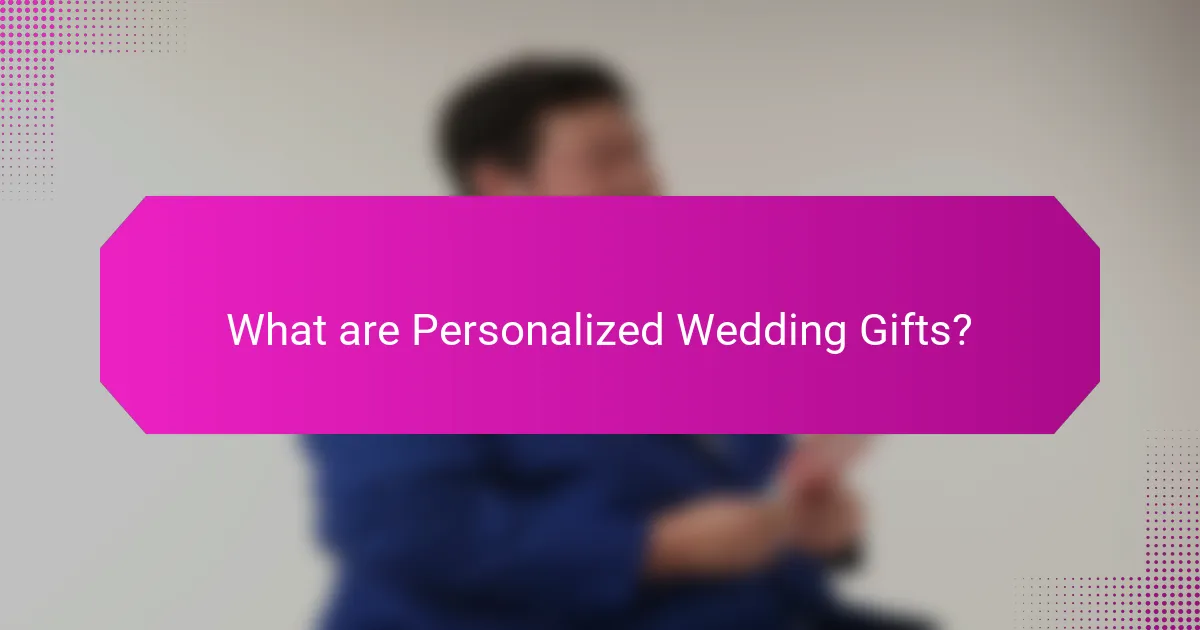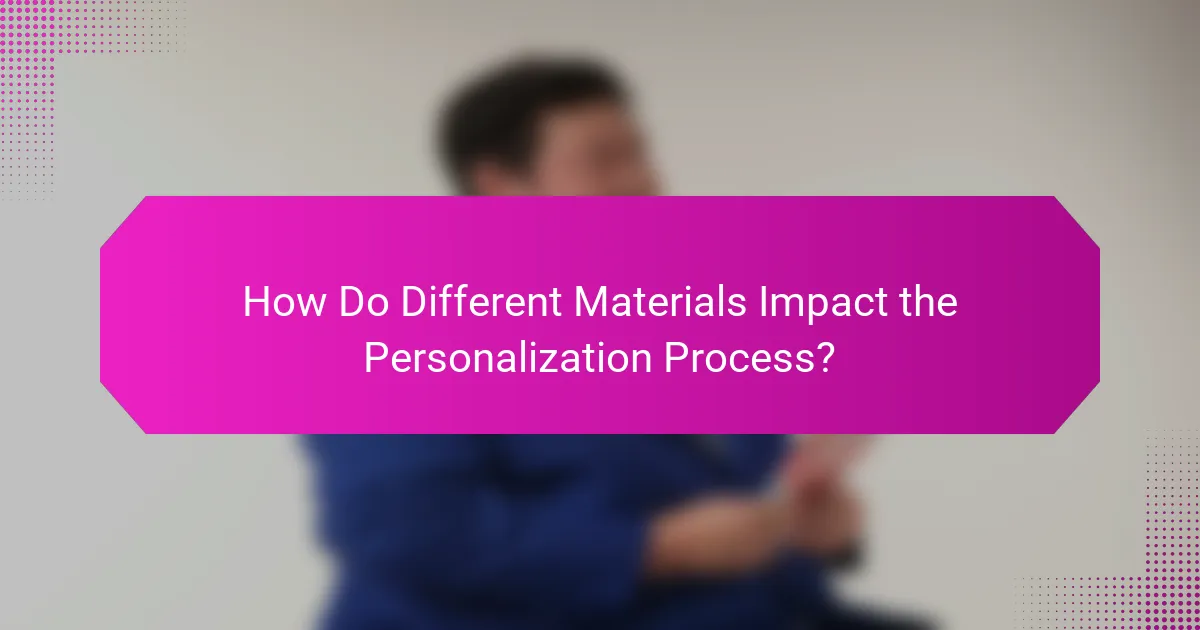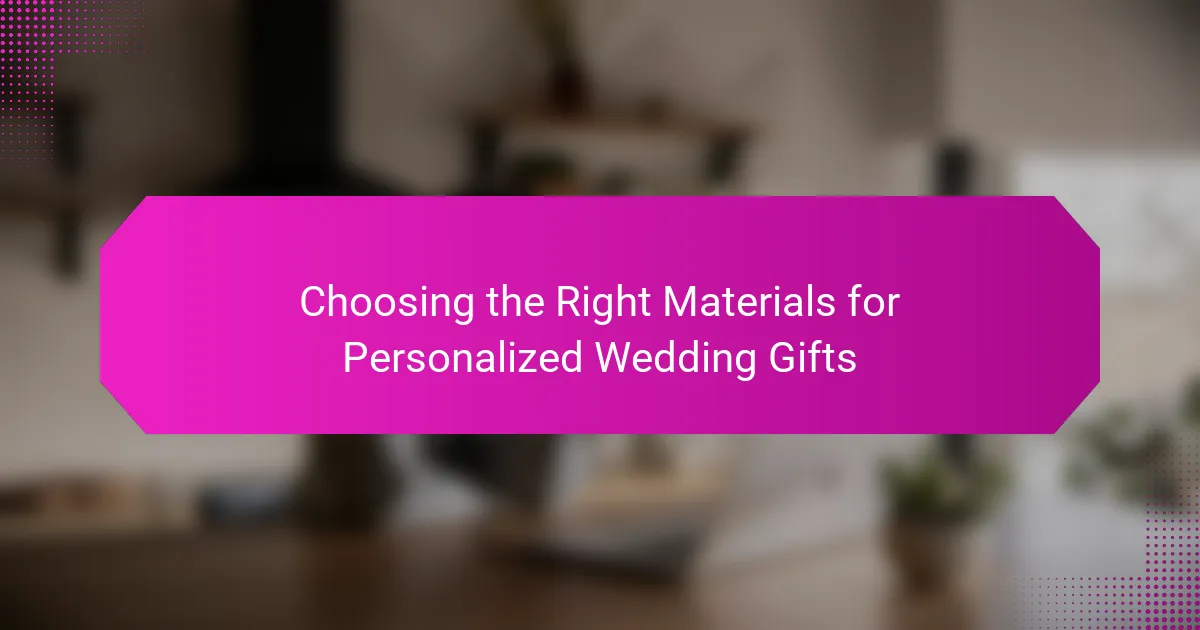Personalized wedding gifts are unique items specifically tailored for couples, featuring custom engravings, names, or dates that hold special significance. This article explores the importance of selecting the right materials for these gifts, highlighting how different materials like wood, metal, glass, and fabric influence durability, aesthetic appeal, and customization options. It emphasizes the emotional value added through personalization and discusses considerations such as the couple’s style, occasion, maintenance, and budget. By understanding these factors, gift-givers can create meaningful and lasting keepsakes that celebrate love and commitment.

What are Personalized Wedding Gifts?
Personalized wedding gifts are unique items tailored specifically for the couple getting married. These gifts often feature custom engravings, names, or dates that hold special significance. They serve as memorable keepsakes that celebrate the couple’s love and commitment. Personalized gifts can include items such as custom photo albums, monogrammed kitchenware, or engraved jewelry. The personalization adds emotional value, making the gift more meaningful than standard options. Studies show that personalized gifts are often more appreciated and cherished, enhancing their sentimental worth.
Why are Personalized Wedding Gifts Popular?
Personalized wedding gifts are popular because they offer a unique touch that standard gifts cannot provide. These gifts reflect the couple’s individual personalities and shared experiences. Personalization creates emotional connections, making the gift more memorable. Statistics show that 70% of couples prefer gifts that are tailored to their specific tastes. This trend highlights the desire for meaningful and thoughtful gestures. Additionally, personalized gifts often become cherished keepsakes, enhancing their sentimental value over time.
What emotional value do Personalized Wedding Gifts provide?
Personalized wedding gifts provide significant emotional value by creating lasting memories for the couple. These gifts often reflect the couple’s unique relationship and shared experiences. Personalization adds a touch of thoughtfulness that generic gifts lack. This thoughtfulness strengthens emotional connections between the giver and the recipients. Research indicates that personalized gifts evoke stronger emotional responses than non-personalized ones. A study published in the Journal of Consumer Research found that customized items are perceived as more valuable. This perceived value enhances the sentimental significance of the gift. Ultimately, personalized wedding gifts serve as cherished keepsakes that celebrate love and commitment.
How do Personalized Wedding Gifts enhance the wedding experience?
Personalized wedding gifts enhance the wedding experience by creating lasting memories for the couple. These gifts reflect the couple’s unique relationship and shared history. They often include names, dates, or special messages, making them more meaningful. Personalized items foster emotional connections between the giver and the recipients. Studies show that personalized gifts are perceived as more thoughtful and cherished. This can lead to increased satisfaction and joy during the celebration. Additionally, such gifts can serve as keepsakes that couples treasure for years. Overall, personalized wedding gifts contribute to a more memorable and intimate wedding experience.
What Types of Materials Can Be Used for Personalized Wedding Gifts?
Personalized wedding gifts can be made from various materials. Common materials include wood, metal, glass, and fabric. Wood is often used for engraved items like cutting boards or photo frames. Metal can be utilized for custom jewelry or engraved keepsakes. Glass is popular for personalized drinkware or decorative items. Fabric is commonly used for custom blankets or embroidered linens. These materials allow for unique customization options, enhancing the sentimental value of the gifts.
What are the most common materials for Personalized Wedding Gifts?
The most common materials for personalized wedding gifts include wood, glass, metal, and fabric. Wood is often used for items like engraved cutting boards and photo frames. Glass is popular for personalized drinkware and decorative pieces. Metal is frequently chosen for custom jewelry and keepsake boxes. Fabric is commonly used for personalized throws and embroidered linens. Each material offers unique qualities that enhance personalization, making gifts more meaningful.
How does the choice of material affect the longevity of the gift?
The choice of material significantly affects the longevity of a gift. Durable materials like stainless steel and hardwood resist wear and tear over time. In contrast, materials such as paper or low-quality plastics degrade quickly. Longevity is also influenced by the environment where the gift is kept. For example, metal can corrode in humid conditions, while glass may shatter easily. High-quality materials often come with warranties, reflecting their expected lifespan. Research shows that gifts made from premium materials retain their aesthetic appeal longer. Thus, selecting the right material is crucial for ensuring the gift lasts.
What Factors Should You Consider When Choosing Materials?
When choosing materials for personalized wedding gifts, consider durability, aesthetics, and cost. Durability ensures the gift lasts over time. Aesthetics relate to how visually appealing the material is, impacting the overall design. Cost affects budget constraints and overall value. Additionally, consider the recipient’s preferences and the occasion’s significance. For instance, materials like wood or metal may convey a rustic or elegant feel. Research indicates that 70% of consumers prioritize durability in gift selection, highlighting its importance.
How does the couple’s style influence material selection?
A couple’s style significantly influences their material selection for personalized wedding gifts. Their aesthetic preferences dictate the choice of materials that align with their vision. For example, a couple with a modern style may prefer sleek metals or glass. In contrast, those with a rustic style might opt for wood or burlap. The selected materials reflect their personality and shared values. This alignment enhances the emotional significance of the gifts. Additionally, trends within their style can guide material choices, such as eco-friendly options for environmentally conscious couples. Ultimately, the couple’s style shapes the overall look and feel of the gifts, ensuring they resonate with their unique identity.
What is the significance of durability in material choice?
Durability is crucial in material choice for personalized wedding gifts. It ensures that the gift withstands wear and tear over time. Durable materials maintain their appearance and functionality longer. This longevity enhances the sentimental value of the gift. For example, materials like stainless steel or hardwood resist damage and aging. Research shows that gifts made from durable materials are often kept longer, increasing their emotional significance. In contrast, fragile materials may lead to disappointment if they break or deteriorate quickly. Thus, selecting durable materials is essential for creating lasting memories.

How Do Different Materials Impact the Personalization Process?
Different materials significantly impact the personalization process by affecting durability, aesthetic appeal, and customization options. For instance, wood offers a warm, natural look and can be easily engraved, making it popular for personalized gifts. Metal materials, such as stainless steel, provide a sleek finish and are resistant to wear, allowing for long-lasting engravings. Glass allows for intricate designs and offers a sophisticated appearance, but it requires careful handling. Fabrics, like cotton or linen, can be embroidered or printed on, providing versatility in design. Each material’s properties influence how well it can be personalized and the overall perception of the gift. For example, a study from the Journal of Consumer Research indicates that materials with tactile qualities enhance emotional connections to personalized items. Thus, choosing the right material is crucial for effective personalization.
What are the best materials for engraving and etching?
The best materials for engraving and etching include wood, metal, glass, and acrylic. Wood is popular for its natural beauty and ability to hold intricate designs. Metal, such as stainless steel or brass, offers durability and a sleek appearance. Glass allows for elegant, detailed etching that enhances its aesthetic appeal. Acrylic is lightweight and versatile, making it suitable for various designs. Each material provides unique qualities that cater to different engraving and etching needs.
How does the texture of a material affect engraving quality?
The texture of a material significantly influences engraving quality. Smooth textures allow for cleaner and more precise engravings. Rough or uneven surfaces can lead to inconsistent depth and clarity in the engraved design. The laser or tool used in engraving interacts differently with various textures. For instance, softer materials may absorb more heat, causing distortion. Harder surfaces may resist engraving, requiring more power and resulting in potential damage. Studies show that materials like glass and polished metals yield superior engraving results compared to porous or fibrous materials. Therefore, selecting a material with an appropriate texture is crucial for achieving high-quality engravings.
What materials are best for printing personalized messages?
The best materials for printing personalized messages include paper, canvas, wood, glass, and metal. Paper is versatile and widely used for cards and invitations. Canvas offers a textured finish for wall art. Wood provides a rustic appeal for signs and keepsakes. Glass allows for elegant engraving and etching. Metal is durable and suitable for plaques and tags. Each material enhances the personalization aspect, making gifts unique and memorable.
How do various materials contribute to the overall aesthetic?
Various materials significantly contribute to the overall aesthetic of personalized wedding gifts. The choice of materials impacts visual appeal, texture, and emotional resonance. For example, wood often provides a rustic and warm feel, enhancing a natural aesthetic. Metal can impart a modern and sleek look, adding sophistication to the gift. Glass offers elegance and transparency, allowing light to play through, which enhances the visual experience. Fabrics like silk or linen can add softness and warmth, creating a cozy and inviting appearance. The combination of these materials can evoke specific emotions and memories, making the gift more meaningful. Each material’s unique attributes influence how recipients perceive and appreciate the gift’s design and sentiment.
What are the visual characteristics of wood versus metal?
Wood has a natural, organic appearance characterized by grain patterns and varied colors. It often displays warm tones, such as browns and reds, which can evoke a sense of warmth. The texture of wood can range from smooth to rough, depending on the finish applied. In contrast, metal presents a sleek, polished look that can be shiny or matte. Its colors are typically cooler, including silvers, grays, and blacks. Metal surfaces can reflect light, creating a modern aesthetic. The visual characteristics of wood and metal differ significantly, influencing their use in design. Wood’s unique grain makes each piece distinct, while metal’s uniformity can suggest precision and durability.
How does color play a role in material selection for personalization?
Color significantly influences material selection for personalization. It affects emotional responses and aesthetic appeal. Different colors evoke distinct feelings; for example, blue signifies calmness, while red represents passion. The choice of color can enhance the perceived value of personalized items. Studies show that color impacts consumer purchasing decisions by up to 85%. Additionally, matching colors to personal preferences can create a stronger connection to the gift. This connection can lead to increased satisfaction and appreciation from the recipient. Therefore, understanding color psychology is essential for selecting materials that resonate with individual tastes.

What Are Some Tips for Selecting the Right Material for Personalized Wedding Gifts?
Consider the recipient’s preferences when selecting materials for personalized wedding gifts. Materials like wood, glass, and metal can be great choices. Wood offers a warm, rustic feel and is often used for engraved items. Glass allows for intricate designs and personalization, making it elegant. Metal, such as stainless steel, is durable and can be customized with various finishes.
Think about the occasion and the couple’s style. For a modern couple, sleek materials like acrylic or polished metal may be ideal. For a traditional couple, classic options like ceramic or engraved silver can resonate well.
Durability is also a key factor. Choose materials that can withstand daily use, such as stainless steel or quality wood. Consider the maintenance required for each material. Some materials may need regular care, while others are low-maintenance.
Lastly, budget plays a significant role. Certain materials may be more expensive than others. Prioritize quality within your budget to ensure a lasting gift.
How can you match materials to the couple’s preferences?
To match materials to the couple’s preferences, first identify their style and tastes. Conduct discussions or surveys to gather information on their favorite colors, textures, and themes. Analyze their lifestyle, such as whether they prefer modern or traditional aesthetics. Consider their values, including sustainability or luxury, which can influence material choice. Research popular materials like wood, metal, or fabric that align with their preferences. For example, eco-conscious couples may favor bamboo or recycled materials. Use this gathered data to select materials that resonate with the couple’s identity and vision for their wedding gifts.
What questions should you ask the couple to determine their style?
To determine a couple’s style, ask them about their favorite colors. Inquire about the themes they are drawn to, such as rustic or modern. Ask about their hobbies and interests, which can influence their style. Discuss their preferred materials, like wood or metal. Explore their vision for the wedding, including decor and ambiance. Inquire about their favorite travel destinations for inspiration. Ask about any cultural or family traditions they want to incorporate. Finally, discuss their overall aesthetic preferences, such as minimalist or elaborate designs.
What are common pitfalls to avoid when choosing materials?
Common pitfalls to avoid when choosing materials include overlooking durability, ignoring maintenance requirements, and failing to consider the recipient’s preferences. Durability is crucial; materials that wear out quickly can diminish the value of personalized gifts. Ignoring maintenance can lead to dissatisfaction; some materials require specific care that recipients may not be willing to provide. Additionally, failing to consider the recipient’s preferences may result in gifts that are not appreciated. For example, selecting a material that is not aligned with the recipient’s style or values can lead to a lack of emotional connection.
How can you ensure the material is suitable for the intended use?
To ensure the material is suitable for the intended use, assess its properties against the requirements of the gift. Identify the function of the gift, such as durability or aesthetic appeal. Choose materials that align with these functions, like wood for longevity or fabric for comfort. Verify the material’s compatibility with personalization methods, such as engraving or printing. Test the material for quality and safety, especially if it will be used by children or in food-related contexts. Research material care instructions to ensure longevity and usability. Consult reviews or expert recommendations to validate your material choice.
What are some budget considerations when selecting materials?
Budget considerations when selecting materials include cost per unit, quality, and availability. Cost per unit affects the overall budget significantly. Higher quality materials may have a higher initial cost but can offer better durability. Availability can influence pricing, as rare materials may increase expenses. Shipping costs should also be factored in, especially for bulk orders. Additionally, local sourcing can reduce transportation costs. Discounts for wholesale purchases can provide budget relief. Lastly, consider the long-term value of materials in relation to the intended use.
The main entity of this article is personalized wedding gifts, which are unique items specifically tailored for couples, often featuring custom engravings or significant dates. The article explores the popularity of these gifts, emphasizing their emotional value and the ways they enhance the wedding experience. It also examines various materials used in creating personalized gifts, such as wood, metal, glass, and fabric, highlighting their durability, aesthetic appeal, and the impact on personalization. Additionally, the article provides tips for selecting the right materials based on the couple’s preferences, budget considerations, and common pitfalls to avoid in the decision-making process.
